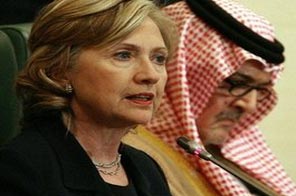Major powers deny new nuclear offer for Iran
WASHINGTON: The United States, France and Russia denied a new nuclear fuel supply proposal had been given to Iran, as claimed by Tehran, while Israel pushed for harsh sanctions to contain the regime's atomic ambitions.
"There is no new proposal on the table," insisted White House spokesman Mike Hammer after the head of Iran's atomic energy organization, Ali Akbar Salehi, said a new offer had been levied by the major powers beyond the previous offer for Tehran to ship out low enriched uranium and get fuel from France and Russia.
"Mr Salehi ought to know the only offer is the one which was proposed by the IAEA (International Atomic Energy Agency) in October, and which has so far not received a satisfactory response," said French foreign ministry spokesman Bernard Valero.
Under the proposal drafted by the UN watchdog and backed by the major powers, Iran would ship out most of its uranium stocks in return for receiving fuel for a Tehran reactor.
Salehi told domestic news agencies the new proposal -- of which he gave no details -- had come in response to Iran's move last week to begin enriching uranium itself to the 20-percent level required for a Tehran medical research reactor.
Western governments have been pushing for Iran to ship out all of the low enriched uranium before receiving any fuel, as Iran insists it should only send out the uranium as it receives the fuel and demands the exchange happen on its own soil.
Meanwhile on a visit to Moscow -- where any new proposal for Iran was also denied -- Israeli Prime Minister Benjamin Netanyahu on Monday urged Russian President Dmitry Medvedev to back tough sanctions. Related article: Netanyahu asks Russia to back sanctions
"What is needed now is biting sanctions that have the power to influence the regime, bitter sanctions that have to hit, in a convincing way, the (Iranian) oil industry, imports, exports and refining," Netanyahu told reporters.
In the wake of heightened rhetoric and stalled negotiations over Iran's advancing nuclear programme, major powers led by Washington have been lobbying for punishing sanctions. Related article: Saudi Arabia plays down China deal on Iran
China appears to be the strongest holdout to sanctions among the five veto-wielding permanent members of the UN Security Council.
US Secretary of State Hillary Clinton was also Monday pushing hard for movement on tough sanctions, with more than four hours of private talks with Saudi Arabia's King Abdullah at his desert camp near Riyadh. Related article: Clinton town hall chat
The UN nuclear watchdog has proposed that as a compromise to the October offer, the fuel be swapped in a third country.
Turkey, which has good relations with its Iranian neighbour, has offered to host the exchange and the offer could be on the table when Turkish Foreign Minister Ahmet Davutoglu holds talks in Tehran on Tuesday.
Turkish Prime Minister Recep Tayyip Erdogan lamented on Sunday however that several months of efforts by Ankara to broker a compromise had yet to bear fruit.
"The International Atomic Energy Agency has said Turkey could serve as the centre for the exchange of uranium... but there is no agreement up until now," he told a press conference in Doha.
Erdogan held talks with Clinton in the Qatari capital, as the top US diplomat kicked off a short Gulf tour aimed at drumming up support for Iran sanctions.
This month France holds the rotating chair of the UN Security Council and Paris officials said last week they plan to hold a vote on a tough new package of sanctions targeting Iran's oil-dominated economy.
Turkey insists the nuclear row should be resolved through dialogue, arguing economic sanctions or military action against Iran would have a damaging impact on the whole region.






